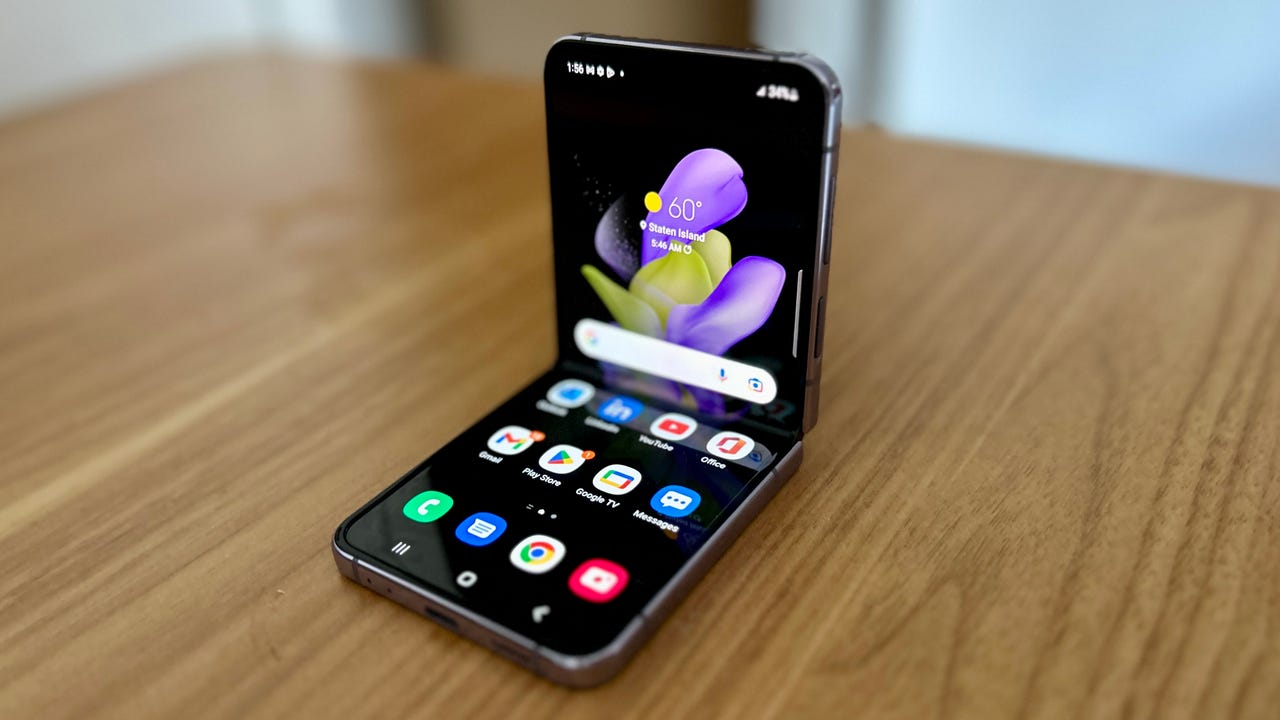































 Sabrina Ortiz/
Sabrina Ortiz/ Foldable phones, especially flip-style ones, combine nostalgia, portability, and the intelligence of modern-day smartphones, which should, in theory, make them a highly appealing piece of technology for all ages.
I have owned theSamsung Galaxy Z Flip 4 for about a year, and some innovative features made the potential of foldable phones clear to me, such as taking selfies hands-free, the ability to fit a phone in my pocket comfortably, and the general excitement when people around me see the unique design of the handset.
Also: Every product we're expecting at Samsung's July Unpacked
However, foldable phones are still prone to, well, foldable problems, such as display failures and compromised specs, preventing them from competing with traditional, more reliable smartphones.
At Samsung's Unpacked event next week, the tech giant will unveil its newest flip phone, the Galaxy Z Flip 5. Here are some features I'm hoping Samsung implements to help the Z Flip 5 overcome its predecessors' shortcomings and become the company's most competitive foldable yet.
When I first got the Z Flip 4, I thought the external screen was one of the most remarkable features since it allowed for texting and calling without needing to open up the phone. The extent of both of those was limited, of course.
Soon enough, I quickly realized that the 1.9-inch screen external screen was still too small, so much so that opening the phone and using the more standard-sized inner display made more sense 95% of the time.
Also: The Galaxy Z Flip 4 solved these two big problems for me
The concept of an external screen is great because not opening your phone could be a productivity enhancer (and energy saver). However, the screen would have to be much larger to accomplish that purpose, as demonstrated by the recent Motorola Razr Plus.
The larger display on the Motorola Razr Plus makes the device when folded ideal for interactive, glanceable widgets.
June Wan/Foldable phones are often marketed for their compactness, with form factors that literally bend in half so that they can fit in just about any pocket or sleeve. This is especially valuable considering how smartphones keep getting bigger, and smaller models like the iPhone Mini are being discontinued.
However, to truly realize the portability of flip phones, the phones should close completely shut when folded, passively improving dust resistance and prolonging the lifecycle of such devices. With the Z Flip 4, the clamshell design left a gap between the upper and bottom halves of the display (seen above).
Also: Samsung's new foldables will have one very important feature no one is talking about
This cosmetic imperfection raised durability concerns since dust, sand, dirt, and other particles could easily get into the phone's inner display and, worst-case scenario, compromise its functionality.
Even if Samsung doesn't make a gapless design this time around, an improved IP dust rating would be ideal. Motorola's Razr Plus is certified IP52, and Samsung should follow suit with Z Flip 5.
We rely on smartphones more than ever, including for media consumption, composing emails, filming and photography, and creating digital content.
Because of that, and how power-demanding many everyday tasks can now be, an essential part of a smartphone is a powerful battery that can last long and charge fast. This is especially true with Samsung's Galaxy Z Flip, which is often pitched towards content creators, users who are constantly recording, editing, and exporting videos.
Also: Samsung Galaxy Z Flip 5 rumored to be 50% more durable than Flip 4
The Z Flip 4 had a decent-sized 3,700mAh battery that was just good enough to last you a day. It, however, pales in comparison to that other Samsung phones, such as the smallest Galaxy S23, which has a 3,900 mAh battery.
There was a 12% battery increase from the Z Flip 3 to the Z Flip 4. Hopefully, the Z Flip 5 will follow this trend and give users a longer-lasting experience.
 Hot Tags :
Tech
Our process
Smartphones
Hot Tags :
Tech
Our process
Smartphones